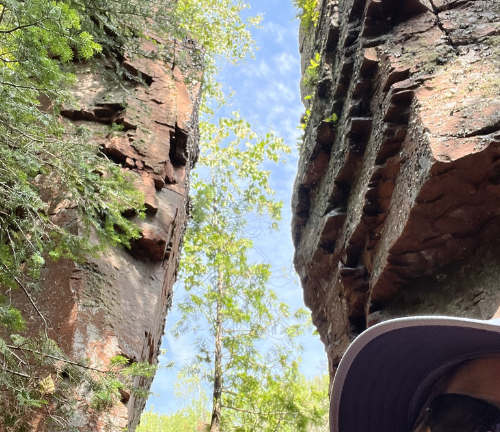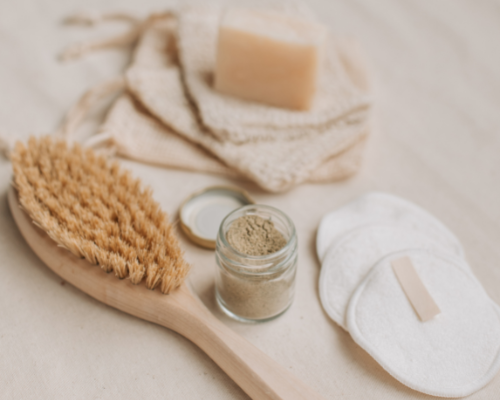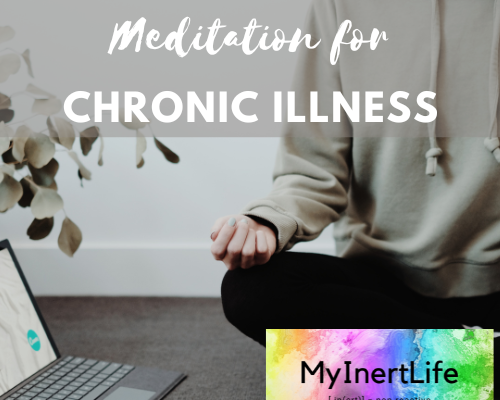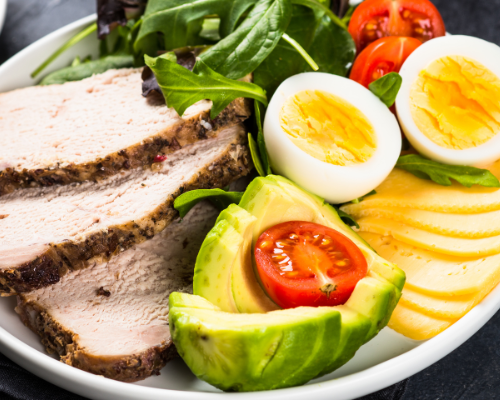This post is Day 13 of solo backpacking the SHT with MCAS continues my journey on the Superior Hiking Trail with a chronic condition called Mast Cell Activation Syndrome (MCAS).
Table of Contents
No Bugs!
I set off from the Split Rock River Wayside under blue skies headed toward Blueberry Hill. From the wayside the trail dips under Highway 61 through a tunnel, emerging above Lake Superior with views of the bay. From there I walked a quarter of a mile on the paved Gitchi Gami trail, before crossing over Hwy. 61 again and heading uphill.
There were no bugs to speak of, so I only wore my mesh bug-proof pants, which I’ve found helpful when walking through tall weeds. I tend to react to contact with many plants, and the mesh pants help because the plant oils seem to rub onto my pants without getting on my skin, while still being cool and breathable.
After another half-mile, I connected to the main Superior Hiking Trail and began climbing up along the east side of the Split Rock River. There used to be a bridge to cross the river at about 2.5 miles in, but it was washed away some years ago, and never rebuilt due to the area’s remoteness. Since the water level was relatively low I could take my shoes and socks off and hop across the rocks to the west side where I filtered some water and had a snack.
From there I traveled down the west side of the river and then left the river behind after another couple of miles. The next body of water I crossed was Skunk Creek over a bridge, which had a day shelter nearby.
I hadn’t known if I would feel up to going all the way to the Blueberry Hill campsite until I was out on the trail, but it felt good to be out and the day was perfect. So I kept going and the next section took me gradually up Blueberry Hill across rocky exposed areas interspersed with cedar forest.
At the campsite, I was the first to arrive, and chose a place to camp nestled in a birch grove. The weather report said it might rain that evening, and I looked for an area with good drainage and no dead trees overhead. As I was eating dinner it did start to rain, so I hurried through my meal. Around that same time, a thru-hiker named John arrived and began setting up his tent. We chatted for a few minutes before the rain forced us into our respective tents. He was going southbound and hoped to rise early and do 20 miles tomorrow, so we said our goodbyes.
The rain continued most of the night but I was snug and warm in my tent.





What is MCAS?
Mast Cell Activation Syndrome (MCAS) is a chronic condition that affects all organ systems. It can cause severe, disabling symptoms every day, including potentially fatal anaphylaxis. MCAS often occurs with other chronic conditions like Ehlers-Danlos Syndrome (EDS) and Postural Orthostatic Tachycardia Syndrome (POTS). Managing MCAS is challenging because many healthcare providers are unaware of it, and diagnostic tests can be unreliable. Treatments involve using antihistamines, mast cell stabilizers, and avoiding triggers. Check out this post on how to manage MCAS.
The bucket theory
The bucket theory simplifies understanding symptom reactions with MCAS. Imagine your body as an empty bucket you don’t want to overflow. Reactions to various stimuli fill the histamine bucket at different rates, forming the total histamine level (how full your bucket is). More histamine means more symptoms. By managing triggers, reducing exposures, and taking medications and supplements, you can control your bucket’s level.
Know your typical symptom progression
Knowing your symptom progression in a symptom flare is the key to developing your rescue plan. This post discusses how to recognize your symptom progression to be prepared to address those symptoms.
Get my free ebook, symptom log, and meal plan!
Want a tool to easily keep track of your symptoms? Sign up for my newsletter and you will receive my free 50-page ebook of lower-histamine, grain-free, sugar-free recipes, my free symptom log, and a free two-week meal plan!
Sign up for the SSP!
The SSP is a listening therapy based on Polyvagal Theory created by Stephen Porges to unlock your ability to think, feel, and connect better through nervous system regulation. You use the SSP via an app on your phone and listen with over-the-ear headphones to specially filtered music that heals the nervous system, specifically the vagus nerve. You subscribe to the app with a provider like me and listen to the specially curated music for 30 minutes each day for a 5-hour cycle. Studies show the SSP has a profound effect on mental health and chronic conditions
You can sign up for the SSP here!
Order my book!
Rocks and Roots chronicles my journey solo backpacking the Superior Hiking Trail and overcoming nervous system dysregulation, gut dysbiosis, and Mast Cell Activation Syndrome symptoms to hike 328 miles successfully.
Check out this powerful frequency device
Healy is an individualized microcurrent device I use to reduce inflammation. Check out this post for more about Healy.
Sign up for a session!
I provide one-on-one in-person and remote chronic illness and caregiver coaching and Sacred Self-Healing Sessions based on the Sacred Self-Healing Method, a proven novel co-creative healing modality detailed in my Books.
Click here for more information.
What do you think?
I’d love to have your reply below!
Disclaimer
The preceding material does not constitute medical advice. This information is for information purposes only and is not intended to be a substitute for professional medical advice, diagnosis, cure or treatment. Always seek advice from your medical doctor.





